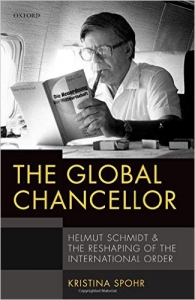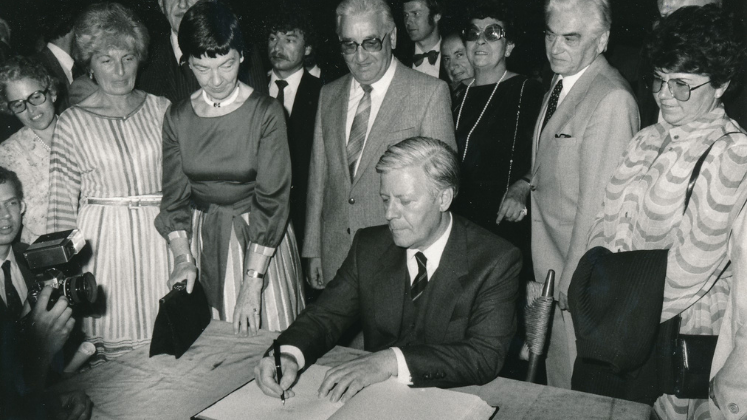In The Global Chancellor: Helmut Schmidt and the Reshaping of the International Order, Kristina Spohr (LSE, International History) reevaluates the Federal Republic of Germany’s fifth chancellor, Helmut Schmidt, from the perspective of his contribution to international diplomacy in the early stages of globalisation. Schmidt emerges as a leader whose unique attributes and comprehensive understanding of international finance and security issues helped to stabilise an international system on the brink of crisis. Reviewed by Patricia Hogwood.
This book review has been translated into Mandarin by Magnus Obermann / 李云龙,LSE-PKU MSc in International Affairs (LN814, teacher Dr Lijing Shi) as part of the LSE Reviews in Translation project, a collaboration between LSE Language Centre and LSE Review of Books. Please scroll down to read this translation or click here.
The Global Chancellor: Helmut Schmidt and the Reshaping of the International Order. Kristina Spohr. Oxford University Press. 2016.
Find this book (affiliate link): ![]()
 By the time of his death in 2015, aged 96, Helmut Schmidt had taken on the role of elder statesman in Germany, an ‘omniscient counsellor’ (Universalratgeber) who pronounced on all significant social, economic and political matters. However, his legacy as chancellor (prime minister) remained overshadowed by the greats, Konrad Adenauer and Willy Brandt, and his successors, Helmut Kohl and Gerhard Schröder. Schmidt was criticised for his managerialist style and a lacklustre approach to domestic challenges that ultimately split his Social Democratic Party (SPD) and brought down his government. Contemporaries and historians alike have found his legacy hard to define, lacking in landmark policy change or enduring achievements.
By the time of his death in 2015, aged 96, Helmut Schmidt had taken on the role of elder statesman in Germany, an ‘omniscient counsellor’ (Universalratgeber) who pronounced on all significant social, economic and political matters. However, his legacy as chancellor (prime minister) remained overshadowed by the greats, Konrad Adenauer and Willy Brandt, and his successors, Helmut Kohl and Gerhard Schröder. Schmidt was criticised for his managerialist style and a lacklustre approach to domestic challenges that ultimately split his Social Democratic Party (SPD) and brought down his government. Contemporaries and historians alike have found his legacy hard to define, lacking in landmark policy change or enduring achievements.
Kristina Spohr’s reappraisal of Schmidt’s chancellorship, The Global Chancellor: Helmut Schmidt and the Reshaping of the International Order, is set on a wider stage. Spohr paints Schmidt as a pivotal figure who actively shaped international affairs in a decade torn by crisis. Schmidt’s term of office (1974-82) spanned the global economic uncertainties following the collapse of the Bretton Woods financial system and successive oil crises, and the faltering détente between the superpowers of the USA and USSR. Inevitably, these pressures raised the international profile of the Federal Republic of Germany (FRG) and its conflicted relations with the ideologically opposed German Democratic Republic (GDR). In an era when global affairs impinged directly on political, social and economic stability across national borders, the two Germanies embodied the Cold War standoff.
Spohr argues that Schmidt’s economic acumen and diplomatic skills were decisive for the emergence of (West) Germany as a politically stable state and world economic leader. Building on Adenauer’s legacy of forging a firm alliance with the western powers (Westbindung) and Brandt’s new direction in opening more constructive relations with the eastern bloc (Neue Ostpolitik), she claims that Schmidt simultaneously continued the post-war work of rehabilitating Germany in the heart of Europe and worked towards a stabilisation of Cold War international relations. Further, Spohr attributes Schmidt with prescience, a man ahead of his time in anticipating the dynamics of the emerging ‘globalisation’ of international relations.
 Image Credit: ‘StAL BA 300’ licensed by Stadtarchiv Linz am Rhein under CC BY SA 2.0
Image Credit: ‘StAL BA 300’ licensed by Stadtarchiv Linz am Rhein under CC BY SA 2.0
She contends that Schmidt was decisive in the development both of informal summitry and of the collective international diplomatic and consultative institutions and mechanisms (particularly the instigation of the Group of Seven (G7) and European Monetary System (EMS)) needed to facilitate cooperation in a world marked not only by geopolitical and ideological conflict, but also by increasing interdependence. Schmidt foresaw and engaged with the seismic geopolitical changes taking place with China’s emergence as a world power. Spohr also credits Schmidt with the embedding of NATO’s 1979 ‘dual-track’ strategy in a move that, together with his intermediary role as ‘double interpreter’ between Moscow and Washington, helped to defuse the Cold War. Furthermore, she argues that if Schmidt had not been so successful in turning West Germany into a major diplomatic actor in the 1970s, Kohl would have found it much more difficult to achieve German unification when the bipolar structures of global international relations imploded in the late 1980s.
Spohr’s argument is presented in a largely chronological narrative, overlaid with thematic chapters that highlight Schmidt’s international leadership skills: the world economist, the strategist of balance, the defusing of the neutron bomb, the constructor of the dual track and the double interpreter. A discursive conclusion touches on many of the issues raised. Throughout the work, Spohr develops a scholarly and well-reasoned argument. A technique of interweaving formative influences on Schmidt the man into the leading narrative on international diplomacy demands close attention from the reader, but is effective in prioritising Schmidt’s leadership credentials and in identifying elements of his legacy.
Spohr succeeds in demonstrating that Schmidt was more than a reactive or pragmatic crisis manager: that his actions were consistent with a wider strategic and intellectually informed framework. Occasionally prone to overstatement, on her own terms she nevertheless makes good her claim that ‘No other statesman of the 1970s was both a doer and thinker on this scale’ (2). By delimiting her study largely to the international arena and Schmidt’s own prioritisation of what he perceived as the ‘two truly existential’ threats of a potential collapse of capitalism and the threat of a third world war, she is able to demonstrate that Schmidt’s particular attributes marked him out as the outstanding leader of his day. Schmidt’s personal failings – most vividly expressed in his catastrophic personal relationship with US President Jimmy Carter – are acknowledged, but his ‘legacy’ failings are sometimes dismissed a little too readily as a product of an unpromising international environment.
However, in restricting her approach largely to documentary analysis, Spohr does not satisfactorily address the problem of the absence of counterfactuals. Would another chancellor have taken more or less cognisance of the early impacts and implications of globalisation, or spotted the rise of China as a global force to be reckoned with? Would another chancellor, spurred on by the responsibilities of Cold War relations at the German coalface, have contributed less or more to the development of the western alliance in terms of the institutionalisation of information sharing, cooperation and collective action? We simply don’t know.
The book and its central advocacy of Schmidt as a protagonist of new modes of multilateralism would also benefit from some consideration of international relations theory. Given the book’s subtitle ‘Helmut Schmidt and the Reshaping of the International Order’, the absence of a theoretical dimension is a little disappointing. Early references to theories expounding individual political agency in international relations (Putnam, 1988; Waltz, 1959; and Spanier, 1972) go undeveloped. A critical engagement with these works might have offered some insight into Schmidt’s difficulties in reconciling his international leadership role with his domestic role of chancellor.
Likewise, it might have been useful to link Schmidt’s international diplomacy with the (neo)liberal approach in international relations theory that developed in the context of the Cold War (e.g. Deutsch et al, 1957; Keohane and Nye, 1977; and Krasner, 1983). These works and others offer an analytical perspective on ‘security communities’ and their incorporation of shared values, the development of common understandings of international challenges and the potential role for multilateral institutions in the governance of collective security problems. Insights from this body of literature would have permitted a more analytical reflection on Schmidt’s deployment of Realpolitik (or, to his detractors, ‘neo-Cold Warrior’ tactics) at the same time as demonstrating an unswerving commitment to the development of international fora for diplomacy and policy development at the highest levels.
In offering an in-depth study and sympathetic evaluation of the political life and legacy of Helmut Schmidt, the neglected chancellor, The Global Chancellor makes a major contribution to our understanding of German leadership and Cold War diplomacy in the tense and uncertain decade of the early 1970s-80s. This work will be appreciated by advanced students of post-war European history and by a wider audience of interested readers, particularly those who lived through these extraordinary times.
Note: This review gives the views of the author, and not the position of the LSE Review of Books blog, or of the London School of Economics and Political Science. The LSE RB blog may receive a small commission if you choose to make a purchase through the above Amazon affiliate link. This is entirely independent of the coverage of the book on LSE Review of Books.
The Global Chancellor: Helmut Schmidt and the Reshaping of the International Order. Kristina Spohr. Oxford University Press. 2016.
Review by Magnus Obermann / 李云龙 (LN814, teacher Dr Lijing Shi)
 在《全球总理:赫尔穆特-施密特和国际秩序的重塑》一书中,克里斯蒂娜-斯波尔(LSE,国际历史)重新评价了德意志联邦共和国的第五任总理赫尔穆特-施密特。斯波尔特别关注施密特在全球化早期阶段对国际外交的贡献。施密特作为一位领导者,他独特的特质对国际金融和安全问题的全面理解帮助稳定了一个处于危机边缘的国际体系。帕特里夏-霍格伍德评论道。
在《全球总理:赫尔穆特-施密特和国际秩序的重塑》一书中,克里斯蒂娜-斯波尔(LSE,国际历史)重新评价了德意志联邦共和国的第五任总理赫尔穆特-施密特。斯波尔特别关注施密特在全球化早期阶段对国际外交的贡献。施密特作为一位领导者,他独特的特质对国际金融和安全问题的全面理解帮助稳定了一个处于危机边缘的国际体系。帕特里夏-霍格伍德评论道。
赫尔穆特-施密特先生于2015年去世,享年九十六岁。此时,他已成为德国的老政客,并被视为可以对所有关键性的社会、经济和政治事务发表意见的”无所不知的顾问”(Universalratgeber)。但是,他在总理任期期间的政绩却仍然被他德高望重的前辈康拉德-阿登纳和威利-勃兰特,以及他的继任者赫尔穆特-科尔和格哈德-施罗德所掩盖。施密特因其管理主义风格和对国内社会矛盾的不温不火的态度而受到批评,这最终导致了他的社会民主党(SPD)的分裂和政府的倒台。经历过那个时代的人和历史学家都认为他的政治上的成就难以界定,并认为,在他任职期间的政策缺乏标志性的变化抑或是对后世有深远的影响。
克里斯蒂娜-斯波尔(Kristina Spohr)对施密特总理任期的重新评估,即《全球总理:赫尔穆特-施密特和国际秩序的重塑》的一书,是从一个更广阔的历史视角出发。斯波尔将施密特描绘成一个关键人物,他在危机林立的十年中积极塑造了国际事务。施密特的任期(1974-82年)跨越了布雷顿森林金融体系的崩溃以及接连不断的石油危机后的全球经济的不确定性,以及美国和苏联这两个超级大国之间摇摆不定的缓和关系。这些国际压力必然提升了德意志联邦共和国(FRG)的国际形象,并激化了与它意识形态相对立的德意志民主共和国(GDR)的冲突关系。在一个全球事务直接影响到跨国界政治、社会和经济稳定的时代,两个德国体现了冷战的对峙。

Image Credit: ‘StAL BA 300’ licensed by Stadtarchiv Linz am Rhein under CC BY SA 2.0
斯波尔认为,施密特的经济头脑和外交技巧对于西德成为一个政治稳定的国家和世界经济领袖具有决定性意义。在阿登纳与西方大国建立牢固联盟(西方阵营)的政治遗产和勃兰特与东方集团建立更具建设性的关系的新方向(东方政策)的基础上,她声称,施密特同时继续了战后恢复德国在欧洲中心的工作,并努力稳定冷战时期的国际关系。此外,斯波尔认为施密特具有先见之明,他在预测国际关系的新兴 “全球化” 动态方面走在了时代的前列。
斯波尔认为,施密特在建立非正式峰会和国际机构以及七国集团和欧洲货币体系(EMS)的协商机制方面具有决定性作用。在一个不仅存在地缘政治和意识形态冲突,而且相互依存度不断提高的世界中,需要这些机制来促进合作。施密特预见到并参与了中国成为世界大国后发生的地缘政治的震荡性变化。斯波尔还认为,施密特将北约1979年的 “双轨制” 战略嵌入其中,加上他作为莫斯科和华盛顿之间的 “双重解释者” 的中介作用,有助于化解冷战。此外,她认为,如果施密特在1970年代没有如此成功地将西德变成一个主要的外交参与者的话,那么当全球国际关系的两极结构在1980年代末内爆时,科尔将会发现实现德国统一的道路困难重重。
斯波尔的论点在很大程度上是按时间顺序叙述的,并叠加了强调施密特的国际领导能力的专题章节。这些章节是:世界经济学家、平衡战略家、原子弹的拆除、双轨制的构建者和双重解释者。一个讨论性的结论触及了所提出的许多问题。在整部作品中,斯波尔提出了一个学术性的、有理有据的论点。文章方面叙述技巧,即将对施密特这个人的形成性影响交织在国际外交的主要叙述中的技巧,需要读者仔细关注,但本书将关注施密特的作为领导人的能力以及确定其政治遗产的要素方面排在首要地位。
斯波尔成功地证明,施密特不仅仅是一个被动的或务实的危机管理者:他的行动与一个更广泛的战略和明智的框架保持一致。斯波尔有时容易夸大其词,但她还是很好地证明了自己的主张,即 “20世纪70年代没有其他政治家能够同时兼顾行动者和思想者的身份”(2)。通过将她的研究主要限定在国际舞台上,以及施密特自己对他所认为的资本主义潜在崩溃和第三次世界大战威胁这”两个真正存在的 “威胁的优先考虑,她能够证明施密特的特殊属性使他成为当时的杰出领导人。施密特的个人失败众人皆知.这一点在他与美国总统吉米-卡特的灾难性个人关系中表现得淋漓尽致,但他的 “遗留的”失败有时被认为是不乐观的国际环境产物而被轻易否定。
然而,由于她的方法主要局限于文献分析,斯波尔并没有令人满意地解决缺乏反例的问题。另一位总理是否会更多或更少地认识到全球化的早期影响和意义,或发现中国作为一种全球力量的崛起?在德国前线的冷战关系责任的刺激下,另一位总理会不会对西方联盟的发展做出更少或更多的贡献?另一位总理是否也会倡导信息共享、合作和集体行动的制度化?我们根本不知道。
该书及其将施密特作为新的多边主义模式的主角的核心主张,也将受益于对国际关系理论的一些考虑。鉴于该书的副标题是 “赫尔穆特-施密特和国际秩序的重塑”,缺乏理论层面的研究有点让人失望。早期提到的阐述国际关系中个人政治机构的理论(Putnam, 1988;Waltz, 1959;和Spanier, 1972)没有得到发展。对这些作品的批判性的见解可能会对施密特在协调其国际领导角色和国内总理角色方面的困难提供一些洞见。
同样,将施密特的国际外交与冷战背景下发展起来的国际关系理论中的(新)自由主义方法(如Deutsch等人,1957年;Keohane和Nye,1977年;以及Krasner,1983年)联系起来可能是有益的。以上这些作品提供了关于 “安全共同体”的分析视角,以及它们对共同价值观的纳入、对国际挑战的共同理解的发展和多边机构在治理集体安全问题上的潜在作用。从这些文献中可以洞察到,施密特对现实政治(或对他的批判者,”新冷兵器 “战术)的部署进行了更多的分析思考,同时显示了他对开展最高级别的外交和政策发展的国际论坛的坚定承诺。
通过对被忽视的总理赫尔穆特-施密特的政治生活和其政治遗产进行深入研究和感性的评价,《全球总理》为我们能供理解,在20世纪70年代初至80年代这紧张而不确定的十年中,德国领导人以及其在冷战外交方面的政策,做出了巨大的贡献。研究战后欧洲历史的学生以及对相关历史感兴趣的广大读者将赞赏这部作品,特别是经历过这些不寻常时代的人们。






